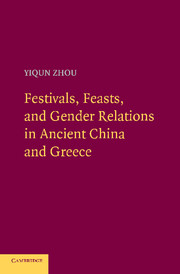1 - Greece
Comrades, Citizens, and Boys
Published online by Cambridge University Press: 03 May 2011
Summary
As Yvon Garlan has noted, the centrality of the warrior was asserted on all levels and in all realms of Greek society, from artistic representations of domestic life to the attributes of the Olympic deities to moral prescriptions on human good. Throughout Greek history, the image of a courageous fighter and loyal comrade was an ideal to which a Greek man was expected to aspire.
In this chapter I examine various aspects of this image as it appears in Greek literary representations of festivities. Military banquets were by no means the only or even the major places where both high competitiveness and strong extrafamilial homosocial bonds were nourished among the champions and citizen-soldiers of Greece. Nor were such bonds restricted to coeval adults. There was great continuity between a military agon (contest) and the agon in the athletic and musical competitions at the numerous public festivals, and the famous Greek pederastic love in its normative, educational function was governed by the same rhetoric of comradeship and agon. At parties and in the gymnasia, the older lover strove to prove himself the worthiest mentor and companion by transmitting his prowess, competitiveness, and social and political wisdom to the boy beloved and by helping the youth grow into a qualified citizen-soldier. The warrior ethos, with its dual valorization of camaraderie and rivalry, fully informed Greek sociability and accounted for the prominence of the comrades, citizens, and boys in Greek literary sources on male convivial life.
- Type
- Chapter
- Information
- Publisher: Cambridge University PressPrint publication year: 2010



